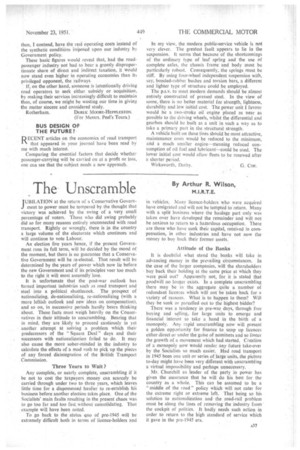The Unscramble
Page 47

If you've noticed an error in this article please click here to report it so we can fix it.
By Arthur R. Wilson, M.I.R.T.E.
JUBILATION at the return of a Conservative Government to power must be tempered by the thought that victory was achieved by the swing of a very small percentage of voters. Those who did swing probably did so for many reasons entirely unconnected with road transport. Rightly or wrongly, there is in the country a large volume of the electorate which continues and will continue to vote Labour.
An election five years hence, if the present Government runs its full term, will be decided by the mood of the moment, but there is no guarantee that a Conservative Government will be re-elected. That result will be determined by the years of power which now lie before the new Government and if its principles veer too much to the right it will most assuredly lose.
It is unfortunate that the post-war outlook has turned important industries such as road transport and steel into a political shuttlecock. The prospect of nationalizing, de-nationalizing, re-nationalizing (with a more leftish outlook and new ideas on compensation), and so on, in successive periods hardly bears thinking about. These facts must weigh heavily on the Conservatives in their attitude to unscrambling. Bearing that in mind, they are likely to proceed cautiously in yet another attempt at solving a problem which their predecessors of the "Square Deal" days and their successors with nationalization failed to do. It may also cause the more sober-minded in the industry to calculate the effects of a mad rush to pick up the pieces of any forced disintegration of the British Transport Commission.
Three Years to Wait.?
Any complete, or nearly, complete, unscrambling if it be not to cost the taxpayers money can scarcely be carried through under two to three years, which leaves little time for a dispossessed haulier to re-establish his business before another election takes place. One of the Socialists' main faults resulting in the present chaos was to go too far and too fast without consolidating, That example will have been noted.
To go back to the status quo of pre-1945 will be extremely difficult both in terms of licence-holders and
in vehicles. Many licence-holders who were acquired have emigrated and will not he tempted to' return. Many with a split business where the haulage part only was taken over have developed the remainder and will not be anxious to return to a hazardous occupation. There are those who have sunk their capital, received in compensation, in other industries and have not now the money to buy back their former assets.
Attitude of the Banks
It is doubtful what stand the banks will take in advancing money in the prevailing circumstances. In the case of the larger companies, will the shareholders buy back their holding at the same price at which they were paid out? Apparently not, for it is stated that goodwill no longer exists. In a complete unscrambling there may be in the , aggregate quite a number of redundant licences which will not be taken back for a variety of reasons. What is to happen to them? Will they be sunk or parcelled out to the highest bidder?
There was a tendency in pre-war days, through free
buying and salting, for large units to emerge and financial interest to take a hand in the birth of a monopoly. Any rapid unscrambling now' will present a golden opportunity for finance to 'snap up licences either direct or under the guise of nominees and so foster the growth of a movement Which had started. Creation of a monopoly now would render any future take-ovei by the Socialists so much. easier. Had road transport in 1945 been one unit or series of large units, the picture. to-day might have been very different with unscrambling a virtual impossibility and perhaps unnecessary.
Mr. Churchill as leader of the party in power has
given the assurance that he will do his best for the country as a whole. This can be assumed to be a "middle of the road" policy which will not cater for the extreme right or extreme left. That being so his solution to nationalization and the road-rail problem must be along the lines of removing the industry from ' the cockpit of politics. It badly needs such action in order, to return to the high Standard of service which it gave in the pre-1945 era.












































































